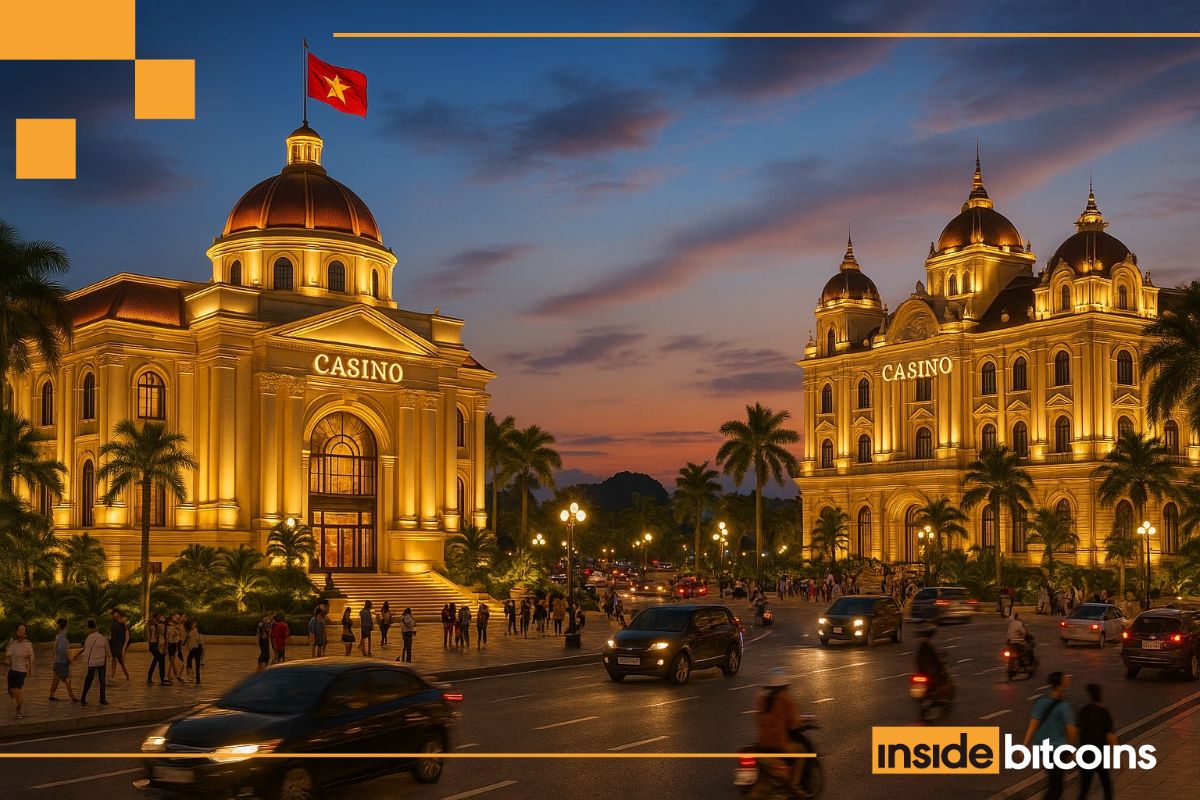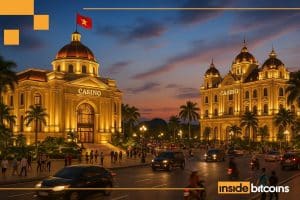The gaming landscape across Southeast Asia is experiencing a dramatic shift, with Vietnam emerging as the latest player to throw its hat into the multi-billion-dollar casino ring. The country’s Ministry of Finance has just submitted a proposal that could reshape the region’s entertainment and tourism sectors—a staggering $2.2 billion casino resort project that signals Vietnam’s serious intent to compete with established gaming powerhouses like Singapore and the Philippines.
Vietnam’s Bold Van Don Vision Takes Shape
The centerpiece of Vietnam’s gaming ambitions is the Van Don casino project, a massive entertainment complex planned for the northeastern province of Quang Ninh. This isn’t just another casino—it’s a comprehensive resort spanning approximately 244 hectares that would rival anything currently operating in the region. The project represents one of the most significant foreign investment opportunities in Vietnam’s history, with a total investment capital of 51.5 trillion VND, equivalent to about 2.16 billion USD.
What makes this project particularly ambitious is its phased development approach. The first phase, running from 2023 to 2027, will see an estimated investment of 25.1 trillion VND, followed by phase two (2027-2031) with 22.08 trillion VND, and a final phase (2031-2032) requiring 4.3 trillion VND. This nine-year construction timeline reflects the massive scope of the undertaking, which will operate for a maximum of 70 years once completed.
The financial structure reveals the scale of confidence investors have in the project. While the investor will contribute 7.7 trillion VND upfront, the remainder will be financed through bank loans. This financing model mirrors successful casino developments across Asia, where initial private investment is leveraged with institutional backing to create world-class entertainment destinations.
Breaking Down Cultural Barriers in Vietnamese Gaming
Perhaps the most significant aspect of Vietnam’s casino proposal is the inclusion of local players. The Ministry of Finance has specifically recommended a pilot scheme allowing Vietnamese citizens to participate in casino gaming at the venue. This represents a major cultural and legal shift for a country that has historically maintained strict restrictions on gambling for its citizens.
Currently, Vietnam operates only two casinos that permit Vietnamese nationals to gamble, a policy enacted in 2016. This limited approach has meant that most Vietnamese gambling activity has occurred underground or through illegal operations. The government’s recent crackdown on illegal gambling rings demonstrates both the prevalence of underground gaming and the authorities’ desire to bring this activity into regulated environments.
Interestingly, this trend toward allowing local participation isn’t unique to Vietnam. Corona Resort & Casino in Phu Quoc recently announced it would temporarily halt access for Vietnamese citizens starting January 1, 2025, due to the expiration of the original three-year pilot program. This creates an opportunity for the Van Don project to capture local market share if approved.
The Historical Context of Asian Gaming Evolution
Southeast Asia’s relationship with gambling stretches back millennia, creating a complex cultural backdrop for modern casino development. In China, archaeological evidence suggests gambling activities date back to 3,000 BC, with dice-like objects and board games forming part of ancient cultural practices. By 1,000 BC, China had developed sophisticated gambling systems including animal fighting bets, mahjong, and early lottery systems.
Singapore’s journey from gambling prohibition to becoming a regional gaming hub offers a compelling parallel to Vietnam’s current situation. The city-state maintained a blanket ban on gambling from 1824 until 2005, when the Casino Control Act paved the way for Marina Bay Sands and Resorts World Sentosa. These integrated resorts, opening in 2009 and 2010 respectively, transformed Singapore into a major Asian gaming destination.
The Philippines presents another interesting case study in regional gaming development. The country’s first legal casino opened in 1977 on a three-deck ship in Manila Bay, though it burned down just two years later. Despite this setback, the Philippines has evolved into a significant gaming market with around 20 land-based casinos in Metro Manila alone. The Filipino experience demonstrates how persistence and proper regulation can create thriving gaming ecosystems.
Thailand’s recent legislative developments add another layer to the regional gaming landscape. In January 2025, Thailand’s cabinet approved draft legislation to legalize gambling and casinos as part of integrated resorts. This Integrated Entertainment Business Act represents a major shift for a country that currently maintains near-blanket gambling prohibition. The Thai government views legalization as a way to combat illegal gambling while generating tourism revenue and protecting consumers.
Technology Trends Reshaping Asian Gaming
The modern casino industry in Southeast Asia is being transformed by technological innovations that enhance both player experience and operational efficiency. Digital payment systems, mobile integration, and sophisticated security technologies are becoming standard across the region’s premium gaming facilities.
Integrated resorts are increasingly incorporating virtual reality experiences, digital table games, and mobile applications that allow players to access services throughout the property. These technological enhancements appeal particularly to younger Asian demographics who expect seamless digital integration in their entertainment experiences. The rise of cryptocurrency and blockchain technology has also influenced regional gaming markets, though often in ways that challenge traditional regulatory frameworks. Vietnam’s recent crackdown on illegal crypto gambling operations highlights the tension between technological innovation and regulatory control.
Artificial intelligence and data analytics are becoming crucial tools for casino operators to understand player behavior, optimize gaming floor layouts, and enhance customer service. These technologies enable personalized marketing approaches that can significantly improve player retention and revenue generation.
In addition, another trend that has been evolving quickly is represented by cryptocurrency-enabled online gambling platforms.
MGM’s Strategic Positioning in Asian Markets
MGM Resorts International has established itself as a major player in Asian gaming markets, with significant investments and strategic partnerships across the region. The company’s experience in developing integrated resorts provides valuable insights for emerging markets like Vietnam and Thailand.
MGM’s presence in Macau through MGM China Holdings demonstrates the company’s understanding of Asian gaming preferences and regulatory environments. The success of MGM Macau and MGM Cotai has shown how Western casino expertise can be adapted for Asian markets while respecting local cultural sensitivities.
The company’s recent advice to the Thai government regarding competitive tax rates and local player access reflects MGM’s broader strategy of supporting market development that benefits both operators and host governments. This approach suggests that MGM views Southeast Asia as a crucial growth region where it can leverage its operational expertise.
MGM’s technological investments in digital gaming platforms and mobile applications have proven particularly relevant in Asian markets, where mobile technology adoption rates exceed global averages. The company’s focus on integrated resort concepts—combining gaming with entertainment, dining, and retail—aligns well with Asian consumer preferences for comprehensive entertainment experiences.
Regional Competition and Market Dynamics
The Southeast Asian gaming market is characterized by intense competition among established and emerging destinations. Singapore’s integrated resorts set high standards for luxury and sophistication, while the Philippines offers more accessible gaming options with lower entry barriers.
Macau remains the region’s gaming revenue leader, though its focus on VIP play creates opportunities for other markets to capture different player segments. The diversification of gaming options across Southeast Asia allows different countries to develop distinct market positions.
Vietnam’s proposed Van Don project appears designed to compete directly with Singapore’s premium integrated resorts while offering advantages such as lower operational costs and potentially more favorable tax rates. The project’s scale and scope suggest ambitions to capture both regional and international gaming tourism.
Thailand’s pending legalization adds another competitive element, as the country’s established tourism infrastructure and cultural attractions could quickly translate into gaming success. The proximity of these markets means that each country’s gaming policies will significantly influence regional player flows and investment decisions.
Economic Projections and Long-term Impact
The economic projections for Vietnam’s Van Don casino project are impressive in scope and scale. Over its 70-year operational lifespan, the complex is expected to contribute approximately 228.928 trillion VND (equivalent to 9.67 billion USD) to the state budget. This includes 134.3 trillion VND in corporate income tax and 94.5 trillion VND in value-added tax.
Employment generation represents another significant economic benefit, with the project expected to create approximately 6,000 jobs. These positions would span various skill levels, from gaming operations and hospitality services to management and technical roles, providing substantial economic opportunities for the local workforce.
The project’s impact extends beyond direct gaming revenue. Integrated resorts typically generate significant spillover effects for local economies through increased tourism, hotel occupancy, retail spending, and related service industries. The Van Don project’s designation as a special administrative zone further enhances its potential to attract international investment and business development.
Regional tourism patterns suggest strong potential for cross-border gaming tourism, particularly given Vietnam’s improving transportation infrastructure and visa policies for international visitors. The country’s existing tourism appeal, combined with world-class gaming facilities, could create a compelling destination for regional and international travelers.
Related News
- Gaming Powerhouse NOVOMATIC Teams Up with Harvest Gaming to Conquer Southeast Asian Markets
- Thailand’s Gambling Revolution: The Making of Asia’s Next Casino Powerhouse
- Austrian Gambling Landscape in Flux: Tax Increases Threaten Casino Operations While Reform Pressure Builds
- Online Advertising’s Influence on Youth: A Closer Look at Gaming and Gambling


